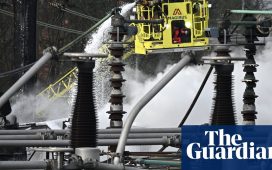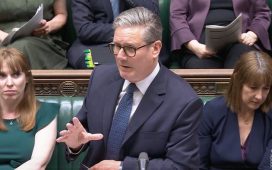Stay informed with free updates
Simply sign up to the UK energy myFT Digest — delivered directly to your inbox.
The UK’s fledgling state-owned energy company will work with the Crown Estate to support the development of offshore wind and other clean technology projects, which ministers claim will help leverage up to £60bn of private investment.
GB Energy, due to be set up in coming months under new legislation, will take steps to get projects off the ground, including by potentially taking a small stake to reduce private investors’ risk.
“This [work] will ensure that future offshore wind development has lower risk for developers, enabling projects to build out faster after leasing and crowding in private sector investment,” the government said.
“It will also help boost new technologies such as carbon capture and storage, hydrogen, wave and tidal energy,” it added, as it announced the partnership on Thursday.
The announcement marks a significant first step for GB Energy, a crucial part of Labour’s election manifesto and its plan to cut the UK’s reliance on fossil fuels and develop new domestic green industries.
Last week, Labour put forward legislation to give fresh borrowing powers to the Crown Estate, a public corporation that runs the British monarchy’s legacy portfolio of land and property holdings, including a lucrative stretch of the seabed that surrounds England, Wales and Northern Ireland.
The Crown Estate said it believed the partnership would help it achieve its plans to lease out by 2030 enough seabed for about 20-30GW of new offshore wind capacity, which could power nearly 20mn homes.
However, leasing the seabed is only the start of a process that can take up to 10 years before offshore wind turbines are built and generating electricity, according to industry experts.
Labour plans to cut carbon emissions from electricity generation to net zero by 2030, a stretching target that experts say will require radical changes to how energy projects are built.
Energy secretary Ed Miliband has sought to move quickly since the election, scrapping the ban on onshore wind in England and unblocking the production of cheap solar energy by approving three huge solar farms in the east of England.
The Crown Estate, which has a £15.5bn portfolio of land and seabed holdings, operates independently and returns its profits to the government.
On Wednesday, it announced profits of £1.1bn, up from £658mn the previous year, driven by offshore wind leasing contracts. The estate said it had 36 wind farms operating across its marine holdings with a combined capacity of 11.8GW.
The Department for Energy Security and Net Zero said it believed the partnership could support the leveraging of “up to £30-60bn of private investment” into projects including offshore wind.
Labour has said it believes GB Energy can eventually play a similar role as other state-backed energy companies abroad, such as Ørsted in Denmark and EDF in France.
GB Energy will receive £8bn of taxpayer money over the five-year parliament and have operational independence with oversight from an independent fiduciary board rather than ministers. Ministers are understood to have scoured the private sector for potential chief executives with Juergen Maier, former head of Siemens UK, widely tipped in Whitehall as a frontrunner.
GB Energy is expected to partner on co-investments in other operators’ early-stage renewables projects before building up to running its own power schemes.
The government statement said the company would be targeting “less developed technologies” such as floating offshore wind and carbon capture.










